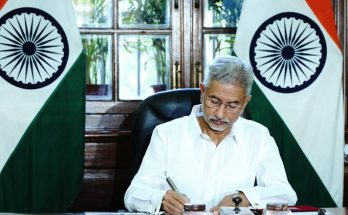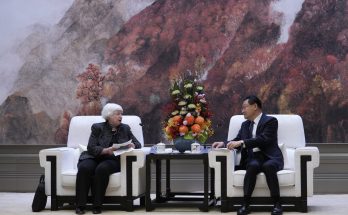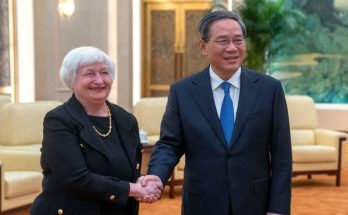 Change seems to be afoot in China’s dealings with the world. At a major conference on foreign affairs in Beijing on November 28-29, President Xi Jinping called on his colleagues to create a “more enabling environment” for China’s development.
Change seems to be afoot in China’s dealings with the world. At a major conference on foreign affairs in Beijing on November 28-29, President Xi Jinping called on his colleagues to create a “more enabling environment” for China’s development.
Xi’s remarks are nuanced and balanced and seek to distance China from its brash and assertive posture which has generated considerable unease in the regions neighbouring China.
At another level, China is signalling that it is a big power and wants to be seen in a more benign light as one, rather than being feared and distrusted , as it is at present.
At a third level, it also reflects a Chinese understanding that despite its impressive capabilities, it is still a relatively passive power as is evident from the Chinese absence in dealing with any of the serious global crises like Ukraine, Syria or Afghanistan.
The “Central Conference on Work Relating to Foreign Affairs” is a special one, being held for the first time since Xi was anointed supreme leader of the party, military and government in November 2012 and March 2013.Its aim was to provide the leadership new ways and means of furthering China’s global interests.
 The work conference was organised by the Central party leadership, meaning the entire Standing Committee of the Chinese Communist Party (CCP) Politburo, the highest decision-making body of the country: Li Keqiang, who is also Premier, Zhang Dejiang who is Chairman of the Standing Committee of the National People’s Congress or the Chinese parliament, Yu Zhensheng, who is also chairman of the National Committee of the Chinese People’s Political Consultative Conference a kind of upper house of Parliament; Liu Yunshan, member of the Secretariat of the Central Committee of the CPC and czar or propaganda and ideology; Wang Qishan, the head of the powerful Central Commission for Disciplinary Inspection which is leading the anti-corruption campaign and Zhang Gaoli who is also Vice Premier.
The work conference was organised by the Central party leadership, meaning the entire Standing Committee of the Chinese Communist Party (CCP) Politburo, the highest decision-making body of the country: Li Keqiang, who is also Premier, Zhang Dejiang who is Chairman of the Standing Committee of the National People’s Congress or the Chinese parliament, Yu Zhensheng, who is also chairman of the National Committee of the Chinese People’s Political Consultative Conference a kind of upper house of Parliament; Liu Yunshan, member of the Secretariat of the Central Committee of the CPC and czar or propaganda and ideology; Wang Qishan, the head of the powerful Central Commission for Disciplinary Inspection which is leading the anti-corruption campaign and Zhang Gaoli who is also Vice Premier.
In addition, the entire Politburo, Central Military Commission, Central Committee Secretariat, State Councilors, ministers, Xinjiang Production and Construction Corps, ambassadors and personnel of international organisations and other high functionaries were also present.
In essence, according to Xinuha, Xi “underscored the importance of holding high the banner of peace, development and win-win cooperation, pursuing China’s overall domestic and international interests and its development and security priorities in a balanced way, focusing on the overriding goal of peaceful development and national renewal, upholding China’s sovereignty, security and development interests, fostering a more enabling international environment for peaceful development and maintaining and sustaining the important period of strategic opportunity for China’s development.”
If you deconstruct this, it means that China will avoid confrontation and promote cooperation because of self-interest. It will not compromise on issues of security and sovereignty, but also ensure that it will use diplomacy and dialogue to attain its goals, rather than force. The message Xi is sending out is that peace and stability are important for China in its current stage of development and any confrontation and tension will actually undermine China’s development.
His thrust was to get the party brass “to have a keen grasp of global developments and follow the underlying trend of the times is a crucially important and constant task that requires our abiding attention.”
The remarks pointed to both the strengths and weaknesses of contemporary China. Xi constantly referred to the need to ensure that nothing disrupted China’s period of “strategic opportunity” and march to the “two centenary goals” – doubling the 2010 GDP and per capita income of rural and urban citizens by 2020, and by building a moderately prosperous society by 2049.
The global environment, Xi noted was changing and it was important to get a grasp of the “long term trend.” His own view on this was that:
1. “The growing trend toward a multi-polar world will not change.”As part of this China should advance multilateral diplomacy and the reform of the international system and global governance.
2. “Economic globalization will not stop.”
3. While the direction of reform of the international system will remain unchanged” there will be a protracted contest over the international order.
4. There will be “uncertainty in China’s neighbouring environment”.
5. But “the general trend of prosperity and stability in the Asia-Pacific region will not change.”
In the ultimate analysis, “Today’s world is changing… the international system and international order are going through deep adjustment…” and “international forces are in profound shift in favour of peace and development [read China]”.
What China needed was a clear understanding of these developments, as well as diplomatic skills to “skilfully defuse potential crises and turn them into opportunities for China’s development.”
However, and this is significant, Xi called on China to behave like a major power. Even while upholding its core interests, China should be able ” to form a network of high interdependence and mutual benefit through extensive and mutually beneficial business and technological cooperation. ”
Xi made the usual references to the need to “firmly uphold China’s territorial sovereignty, maritime rights and interests and national unity, and properly handle territorial and island disputes,” but he also spoke of the need to “promote peaceful resolution of differences and disputes between countries through dialogue and consultation, and oppose the wilful use or threat of force.”
Xi is painfully aware of the fact that China’s assertiveness has only served to scare its neighbours into enhancing defence expenditures and seeking reassurance from the United States. In his view, this is often a consequence of the inability of the world to understand the Chinese perspective and so, he noted that “We should increase China’s soft power, give a good Chinese narrative, and better communicate China’s message to the world”. In line with this there was need to promote neighbourhood diplomacy, promote neighbourhood ties and connectivity with neighbours.
Leading officials from the CPC International Department, Ministry of Foreign Affairs, Ministry of Commerce, Ministry of Culture, Information Office of the State Council, Headquarters of the General Staff of the PLA, Zhejiang Province and the Chinese Embassy in the US spoke at the conference.
Background of the meeting
In the last one year, Xi has set a frenetic pace in his foreign travels. Beginning with Russia in March 2013, he has virtually visited every continent in the world except Antarctica. Some visits are aimed at building strategic ties, such as those to Mongolia, Maldives, Sri Lanka, Fiji, or the four Central Asian republics. Others are to shore up business and trade ties, such as those to Latin American and African countries. Others, such as those to Central and South-east Asia are aimed at both targets. The goal of the US visit in June 2013—a summit with US President Barack Obama, was to persuade the US to take relations with China to a special “new type”.
In the past two months, Xi has hosted leaders of nearly two dozen Asian and Pacific nations at the Asia-Pacific Economic Cooperation (APEC) summit meeting in Beijing; had a summit with President Obama; attended the G-20 meet and made official visits to Australia, New Zealand and Fiji.
At the same time, Chinese policies have led to heightened tensions between China and its neighbours. China and Japan have faced off several times off the Senkaku/Diayouisland and last year, China took the unprecedented step of declaring an Air Defence Information Zone (ADIZ) around the islands over Japanese controlled air space, demanding that all flights through the zone be notified to Beijing.
In the South China Sea, it threw out Philippines from the Scarborough Shoal and has strengthened its military presence there. China has also started building islands in disputed reefs to strengthen its claims. China has also started asserting its authority by issuing fishing permits in what it claims is its EEZ.
These developments have led countries in the region to seek US help and in turn, the US has beefed up its presence in the area. However, this has led to serious confrontations between the US and China.
In December 2013, a Chinese ship abruptly came to a stop in front of a US navy ship and compelled it to take evasive steps. In August 2014, a Chinese fighter buzzed a US aircraft in a dangerous manoeuvre.
These events ratcheted up tensions to the point where there was serious concern over an actual clash, especially between China and Japan.
In the light of this, the current steps taken by Beijing appear to be a step back from the brink. On the sidelines of the APEC summit, Xi Jinping had a short meeting with his Japanese counterpart Shinzo Abe and prior to that a four point plan was agreed upon to reduce tension, promote dialogue and create crisis management mechanisms.
Simultaneously, China also signed two important military confidence building agreements with the US. One provides a mechanism for notifying the two countries of each other’s activities, including military exercises. The second sets rules of behaviour in cases of encounters in the sea and air.
The work conference makes it clear that China still views the US as its main rival as evidenced by Xi’s reference in his speech to the belief that the “growing trend” was towards a multipolar world. Not surprisingly, during the period of the work conference, the People’s Daily overseas edition ran a series of articles between November 25 and 30 criticising the US.
Assessment
The work conference must not be seen as a softening of the Chinese approach towards security issues. Xi was quite emphatic about the zeal with which he intended to protect China’s core interests. Actually, it probably represents changed tactics to deal with neighbours in a more sophisticated manner. China, Xi claimed, was pursuing a “neighbourhood policy featuring amity, sincerity, mutual benefit and inclusiveness.” This is more of a promise of what China now planned to do, rather than what it has been doing.
At one level, it reflected a growing confidence of the Xi team in its ability to handle foreign and security policy issues and to shape events in the manner Beijing desired. No doubt, Chinese leaders have been made aware in the last three years, that despite their growing capabilities, they do not quite have the ability to influence events in any region, but that most proximate to them.
The work conference was carefully timed after the successful APEC summit where the Chinese got the Japanese to back off a bit, and were able to restore their military relations with the US. At the same time, they were able to get an endorsement from the APEC of their plan for a Free Trade Area in Asia Pacific (FTAAP).
The APEC meeting itself came in the wake of the initiation of moves by China and its BRICS partners, to set up the New Development Bank, headquartered in Shanghai. Simultaneously, Beijing has also initiated moves to set up a new Asian Infrastructure Investment Bank (AIIB) with participation of a number of key Asian countries. Around this time, China has also announced massive investment plans within the country, as well as $40 billion for the Silk Road initiative to develop railways, roads, pipelines and ports in areas of its interest.
The aim of the conference is to set the stage for a “new type” of foreign policy which will emphasise Chinese economic powers through new institutions like the New Development Bank, the AIIB, the Silk Road Fund or the proposed FTAAP. It will also see a focusing of Chinese outward bound foreign investment and trade.
Given the language of the speeches, we may see a new thrust in China trying to resolve its disputes with its neighbours through diplomacy and negotiation, rather than brute force. In the South China Sea, China has already changed the facts on the ground, with regard to India it already has what it considers important—Aksai Chin. In the case of Japan, however, it may have realised that it has bitten off more than it could chew and is now seeking to shelve the dispute for some time.
(The writer is a Distinguished Fellow at Observer Research Foundation, Delhi)
Courtesy: ORF
Author Profile
- India Writes Network (www.indiawrites.org) is an emerging think tank and a media-publishing company focused on international affairs & the India Story. Centre for Global India Insights is the research arm of India Writes Network. To subscribe to India and the World, write to editor@indiawrites.org. A venture of TGII Media Private Limited, a leading media, publishing and consultancy company, IWN has carved a niche for balanced and exhaustive reporting and analysis of international affairs. Eminent personalities, politicians, diplomats, authors, strategy gurus and news-makers have contributed to India Writes Network, as also “India and the World,” a magazine focused on global affairs.
Latest entries
 In ConversationJuly 26, 2024India-Italy defence collaboration can extend to third countries: Anil Wadhwa
In ConversationJuly 26, 2024India-Italy defence collaboration can extend to third countries: Anil Wadhwa In ConversationJuly 23, 2024Italy views India as a key partner in Indo-Pacific: Vani Rao
In ConversationJuly 23, 2024Italy views India as a key partner in Indo-Pacific: Vani Rao DiplomacyJune 29, 2024First BRICS unveils a roadmap for boosting tourism among emerging economies
DiplomacyJune 29, 2024First BRICS unveils a roadmap for boosting tourism among emerging economies India and the WorldJune 11, 2024On Day 1, Jaishankar focuses on resolving standoff with China
India and the WorldJune 11, 2024On Day 1, Jaishankar focuses on resolving standoff with China






